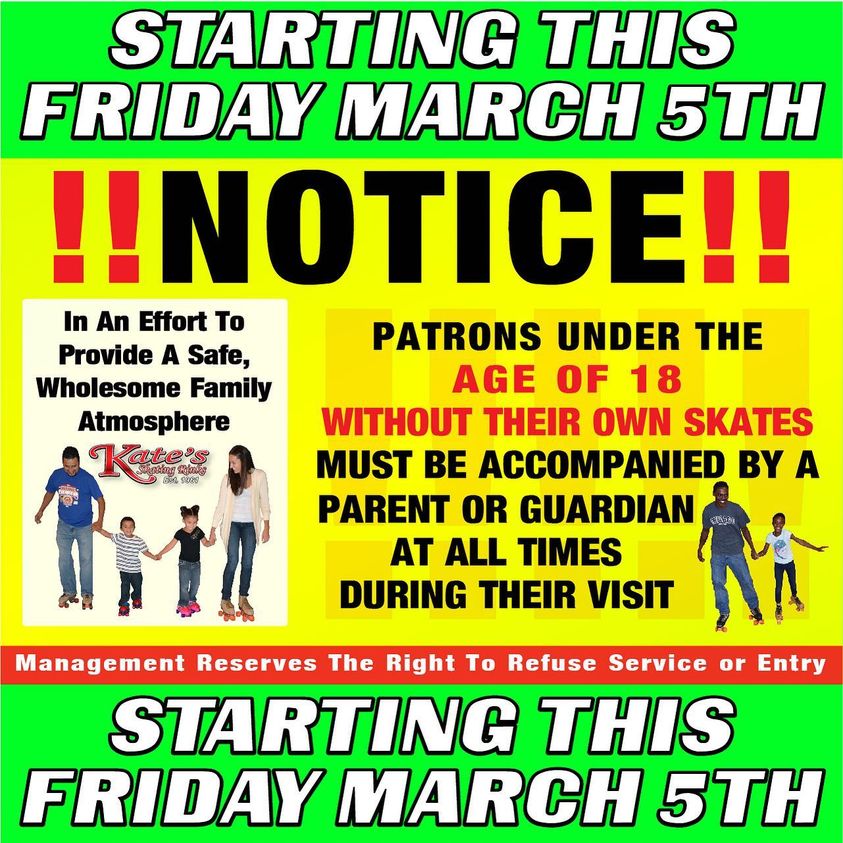Several roller-skating rinks around the country are closing earlier and enforcing strict policies regarding kids under a certain age from being dropped off without adult supervision. The cutoff age for unaccompanied teens is typically younger than 16 for a Friday or Saturday night. There is a caveat, though. If the dropped-off kids (regardless of their age) have their own skates, they can stay without their parents in tow. A handful of adults have complained on social media. One cried out that it’s a slap in the face to “poverty-stricken” families (their words, not mine). She unfairly accused a rink operator of being greedy, assuming the reason for the skate policy is to sell more skates from their pro shop. Nothing could be further from the truth.
Let’s break it down.
Prior to COVID-19, rinks were in a bit of a slump. Few, if any reached full capacity, or even 50% on any given night. Admission prices were always low, even though theaters, trampoline centers, and amusement parks charge much higher rates. It’s amazing to me how many rinks have stayed in business all these years with low prices and few customers to support it.
COVID-19 Changed Everything.
Fast-forward to 2020. Rinks got locked down along with the rest of us stuck at home. Those of us who skate consistently went a bit stir crazy. Kids without regular activity started getting restless as well.
As rinks were given the green yellow light to open, most had to start with either 25 people, 25 percent, or some other arbitrary number issued by their state governors. One Ohio rink owner consistently sold out of advance tickets online and had to turn people away at the door because of the limited capacity. This led to a lot of arguments as well. No one wanted to see this happen. But what choice do they have? They were forced to do so by the health department.
Staying Alive.
You can’t make the mortgage, pay the utilities, insurance, employees, and other expenses on 25 people. That’s why loans were taken out in order to remain in existence. According to Ginger Mathews, aka The Skate Critic, 1,234 rinks are still in operation. And that number is dwindling.
This month, as more COVID-19 restrictions are being lifted, people are headed to roller rinks in droves. In my 40+ years of watching the industry, I have never seen such excitement. Last weekend there was a line wrapped around the building at my local Skate Center with people eager to get in.
Lockdown and emotions.
For diehards like me, I’m happy to see others come to the rink. However, teens driven by emotions and hormones have been causing some trouble. These are the ones who show up, don’t skate and get into fights. The video goes viral and then no one wants to skate there anymore. It’s been problematic at trampoline parks, too. Even Bath and Body Works had an incident this past week with violence erupting between 2 adults waiting in line. The lockdowns have us all pent-up, and we need an outlet.
Why rinks are changing policies.
These new policies at roller rinks are a step in the right direction. People who show up with skates are there to skate. Non-golfers don’t hang out on the course. Kids who don’t practice karate don’t loiter at the dojo. And non-skaters shouldn’t be hanging out in roller rinks. In fact, a North Carolina rink operator with 3 locations explained on their Facebook page that 99% of the problem kids do not own their own skates.
Cutting out the drama.
Parents who accompany their kids provide added supervision in the rink. Kids are usually better behaved around their parents. Those who are not civil tend to be the drop-offs that the parents want to get rid of for a few hours to get away from them for a needed a break. Unfortunately, the rest of the world has to deal with their kid’s bad behavior, and it’s the business owners who bear the brunt when their other customers are chased away. Those who love to skate are not there for the drama. Plus there’s the negative publicity that comes with it when videos start circulating on social media and end up on the evening news.
For skaters, owning is better than renting.
As for the poverty-stricken mom whining about the “price” of buying skates, she should look at the big picture and do the math. Shelling out $4-5 to rent skates once a week for 52 weeks adds up to an additional $200 per kid (which can instead be invested in equipment.) Owning a pair will not only save money every time they go skating (and make them better skaters), they can resell those skates or hand them down to a sibling once they outgrow them.
Renting generates more revenue for rinks
If you think rink owners make more off selling skates vs. renting, then you are mistaken. The markup is really slim and is taxable to the business. The skate pro puts in the time to ensure a good fit, place the order, and adjust them to the skater’s needs. Once they sell a pair of skates, they’ll never receive rental income again from that person.
It’s not greed that spurred this policy. It’s emotionally-driven out-of-control teens and the goal of keeping all guests safe.
I wish all rinks would implement this policy. So far it’s working to maintain civility, enhance safety, and provide a better experience for those who want to skate. Rink owners are reporting positive results as well!



Thank you for your insight into the issue we as rink operators are facing with unruly teens at many facilities accross the country. This article explains perfectly why some of these restrictions are now being enforced to help maintain a fun family experience for all of our skating guests.
Great article Susan, glad to see you are still writing! I enjoyed your articles in Rinksider for many years. There were always problem kids but it seems that the populace has generally become less respectful and polite towards retail businesses and the people that work in these businesses. Getting parents involved in supervising their children is always a good thing.
I’m so glad someone else spoke out on this. Especially to help others understand why this policy is so very needed. Not only that but very effective and an overall win for all.
Owning vs renting skates has nothing to with behavior problem children and teens. As an avid skating family, those that skate together stay together. Categorizing this and breaking it down to who owns their skates vs who doesn’t isn’t even a valid basis in relationship to good or bad behavior with kids/teens at the rink. I have seen behavior issues and it’s usually the kids that DON’T have skates on their feet for the majority of the times. I agree with the poverty stricken person as you so called it…enforcing a rule of “having your own skates” is totally rediculous. The article could have been better written if you get opinions of actual skaters.
Thank you for reading our post and learning more about how and why rink owners are reacting to the increased drama in their business. We appreciate your input.
Fantastically written article explaining a complicated problem. We currently enforce a ‘skates on’ policy, where under 18 must wear skates. This has helped tremendously, but guardians will be our next step in the event that the same issues arise.
Great article. Good to see common sense solutions to complicated problems. Thank you .
We also changed our policy. Friday and Saturday nite skate sessions. All children must have skates on at all times. in the building. If you dont we put you out. Due to to much drama. They are here to skate and have fun. We been in the business for over 50 years.